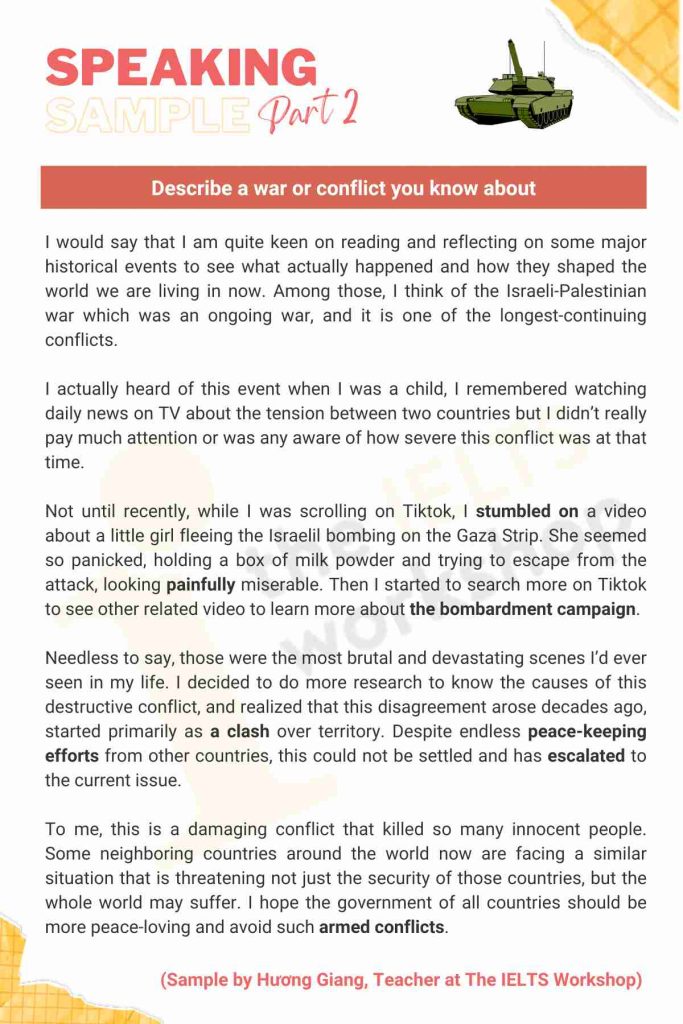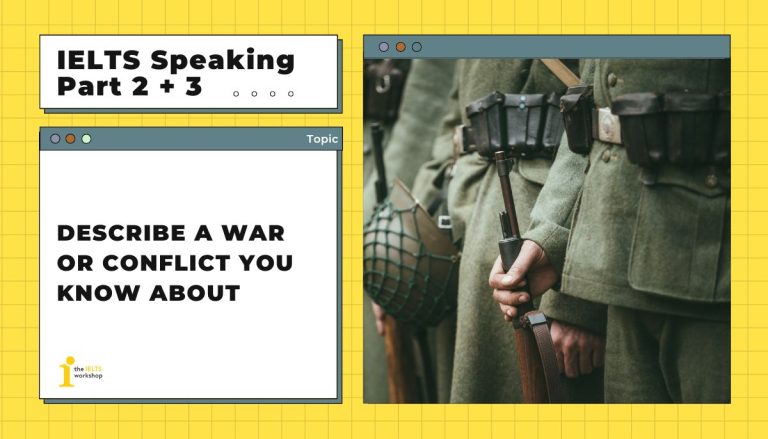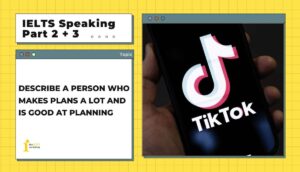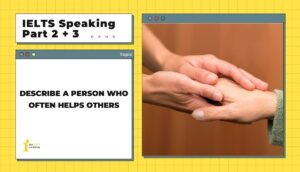Trong chuyên mục giải đề IELTS Speaking kỳ này, cùng tham khảo bài mẫu của cô Hương Giang từ The IELTS Workshop với chủ đề: “Describe a war or conflict you know about”. Cùng tham khảo tự vựng và các cấu trúc ghi điểm nhé.
Part 2: Describe a war or conflict you know about
Describe a war or conflict you know about
You should say:
What it was about
How you know about it
Who was involved in this war or conflict
and explain the outcome of this war or conflict.
Dưới đây là bài mẫu cho topic “Describe a war or conflict you know about”.
1. Bài mẫu (Sample)

2. Từ vựng (Vocabulary)
- painfully: very
- stumble on: tình cờ thấy
- the bombardment campaign: chiến dịch đánh bom
- a clash: cuộc xung đột
- peace-keeping efforts: nỗ lực gìn giữ hòa bình
- escalate: leo thang (căng thẳng)
- armed conflicts: xung đột vũ trang
Part 3
How do the effects of past wars compare to those of today’s conflicts?
How much do you think the way wars are shown in the media affects how people view those conflicts?
How important is it to learn about past wars to understand today’s global problems?
Why do you think some conflicts get more news coverage than others?
How could current global trends like technology and climate change influence future conflicts?
What steps can be taken to stop conflicts from turning into wars?
1. How do the effects of past wars compare to those of today’s conflicts?
Along with the advancement of weapons, the damages that today’s wars cause to the humanity are way more severe compared to most incidents in the past. Some countries are pouring money into a bottomless sink of upgrading and invent new weapons like atomic bombs, biochemical weapons or other weapons of mass destruction. It is really worth concerning that today’s biochemical weapons are more contagious, well modified and even devastating than any other conventional, armoured or past warfares with swords or spears. All of these events, whether in the past or now, have taken their toll on the peace and safety of millions of citizens, so they should come to a stop as quickly and peacefully as possible.
- Pour money into sth: rót tiền vào thứ gì
- Contagious (a): dễ lây lan
- take its/ a toll on: gây thiệt hại lên
- come to a stop: đến hồi kết
2. How much do you think the way wars are shown in the media affects how people view those conflicts?
The way I see it, social media can update information about the ongoing warfare in real time, but there are also risks of spreading misleading information that can escalate tensions and provoke outrage among viewers. That’s why I think contents revolving around warfare should be more closely checked before being published not to cause misunderstandings or hostility biases.
- Misleading: gây hiểu lầm
- Escalate tension: gia tăng căng thẳng
- Provoke outrage: gây phẫn nộ
- Hostility biases: thái độ thù địch
3. How important is it to learn about past wars to understand today’s global problems?
Historical conflicts can always bring about salutary lessons for the government of many countries now. Learning about these occurrences can help us identify the root causes behind conflicts, the long-lasting consequences they could have. From there, we also become more mindful of the invaluable global peace and make efforts to preserve it. The atomic bombings over the two Japanese cities of Hiroshima and Nagasaki clearly remain the only use of nuclear weapons that no countries, I believe, want to try again due to their catastrophic destruction.
- salutary lessons: bài học quý giá (though often seeming unpleasant)
- long-lasting consequences: hậu quả lâu dài
- atomic bombings: vụ đánh bom nguyên tử
- Catastrophic: thảm họa
4. Why do you think some conflicts get more news coverage than others?
There are several factors that can influence whether a conflict receives much or little attention from the media. More often than not, I think the political significance largely affects the amount of media coverage, as some governments use social media to propagate the motivations behind their actions. They want to reach a larger audience to gain more support for their moves. Besides, people are also concerned about how serious the conflict outcome is, so if a dispute raises many humanitarian issues, it will attract much more attention from activists and peace-loving people around the world.
- media coverage: phủ sóng truyền thông
- propagate: tuyên truyền
- a dispute: sự bất hòa
- humanitarian issue: vấn đề nhân đạo
5. How could current global trends like technology and climate change influence future conflicts?
I believe that the technological advancement and the current issue of global warming may fuel further conflicts in the coming years. For one thing, there will be more competition over the ownership of some natural resources and dominance over main trading routes. Meanwhile, the degradation of the environment, water scarcity may also force any governments to constantly seek for new territory for their civilians, which inevitably breeds many disputes among countries.
- fuel further conflicts: châm ngòi thêm các tranh chấp
- Dominance: sự lấn chiếm (lãnh thổ)
- Territory : lãnh thổ
- Inevitably: không thể tránh khỏi
6. What steps can be taken to stop conflicts from turning into wars?
There are some main approaches to resolve conflicts and prevent them from getting worse. First and foremost, effective diplomacy allows different parties conduct negotiations to reach agreements without getting involved in armed combat that can lead to heavy casualties. What’s more, social movements play an integral role, as these activities raise the public’s awareness and their questions of the real purpose of the wars. This would make the government more reluctant to use violence to address disagreements.
- Conduct negotiations: thực hiện đàm phán
- Heavy casualties: thương vong nặng nề
- Social movements: các cuộc vận động
Bài mẫu bởi cô Hương Giang – Giáo viên The IELTS Workshop
Xem thêm: Describe a historical event | Vietnam’s Independence Day – IELTS Speaking Part 2
Trên đây là bài mẫu cho topic: Describe a war or conflict you know about. Các bạn có thể tham khảo Bộ đề dự đoán IELTS Speaking quý 3/2024 của The IELTS Workshop tại đây!
Ngoài ra, khoá học Senior của The IELTS Workshop sẽ giúp bạn nâng cao kỹ năng cũng như xây dựng chiến lược trả lời câu hỏi, tham khảo ngay nhé!!









